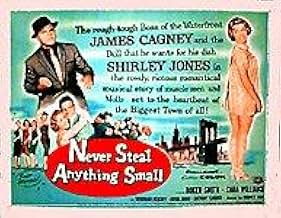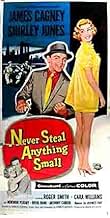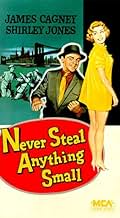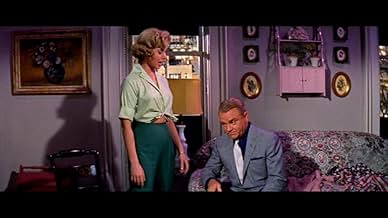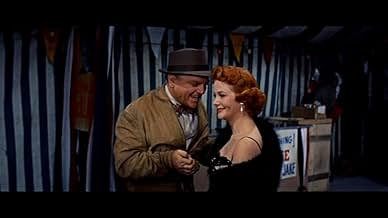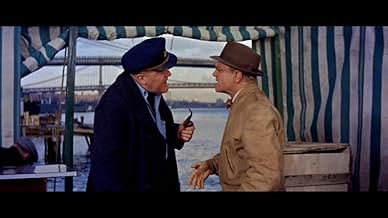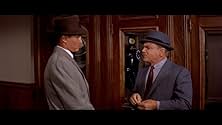Jake MacIllaney desea ganar las elecciones presidenciales del sindicato de estibadores Local 26. Cuando conoce a Dan Cabot y su atractiva esposa, MacIllaney rompe su matrimonio, persigue a L... Leer todoJake MacIllaney desea ganar las elecciones presidenciales del sindicato de estibadores Local 26. Cuando conoce a Dan Cabot y su atractiva esposa, MacIllaney rompe su matrimonio, persigue a Linda y acusa a Dan de hurto mayor.Jake MacIllaney desea ganar las elecciones presidenciales del sindicato de estibadores Local 26. Cuando conoce a Dan Cabot y su atractiva esposa, MacIllaney rompe su matrimonio, persigue a Linda y acusa a Dan de hurto mayor.
- Dirección
- Guionistas
- Elenco
- Premios
- 2 nominaciones en total
- Dirección
- Guionistas
- Todo el elenco y el equipo
- Producción, taquilla y más en IMDbPro
Opiniones destacadas
Firstly, this movie is almost but not quite a full-fledged musical. The film starts out promisingly before the opening credits, with Cagney chanting rhymed verse directly into the camera, recounting the advice handed down to him when he was a lad: 'Never steal anything.' 'Never steal ANYTHING?' asks an incredulous offstage chorus. 'Never steal anything SMALL,' amends Cagney, and we're off to a promising start ... but the promise (and the premise) are never fulfilled.
There are only about three full-fledged musical numbers in the entire movie. One of them, intended to be a satire on TV commercials, is a too-long advertisement for a dishwashing detergent with the unlikely name 'Love', performed by the annoying Shirley Jones. I've never understood the appeal of Shirley Jones, and I find her even less appealing nowadays (I'm writing this in 2003) when she looks like an older version of Hillary Clinton (another actress whose performances have never convinced me). Shirley Jones did have a good coloratura singing voice, but her big 'Love' number in this movie is written to be chanted rather than sung, so it minimises her genuine vocal talent.
The best number in this film (which isn't saying much) is a peppy novelty song called 'I'm Sorry, I Want a Ferrari', performed by Cara Williams and Cagney. We know (from his previous films) that Cagney's a great song-and-dance man, so we really want to see him cut loose with some hoofing in this movie ... but he never does it. The closest Cagney comes to dancing is in the 'Ferrari' number, when he struts along a conveyor belt with Cara Williams (who, like Jones, also fails to convey any appeal to me).
I enjoy musicals, so it seldom bothers me when 'normal' people on screen suddenly burst into song and dance. But in 'Never Steal Anything Small', the musical numbers are so few and far between that we can never really accept this movie as a musical. Consequently, when the characters occasionally DO break into song (after long stretches of straight dialogue), the transition is jarring.
I was delighted when I saw Charles Lederer credited with the screenplay for this movie. Lederer was one of the great wisecrackers of Hollywood's golden age, an iconoclast who knew everyone and had plenty to say. He was also the nephew of Marion Davies, which gave him permanent entree into William Randolph Hearst's estate at San Simeon. (Lederer was the one who tipped off Hearst that Orson Welles was making a movie about a guy named Citizen Kane who bore an unflattering resemblance to Hearst.) I was well and truly hoping that 'Never Steal Anything Small' would be full of Lederer's vintage wisecracks and some Hecht/MacArthur-style dialogue, but I was disappointed.
Most annoying of all is this film's immoral viewpoint. Cagney's character (a big shot in the longshoremen's union) is flagrantly corrupt, but we're expected to cheer him onward because he's a lovable rogue with a line of blarney. Cagney's opponent here is an honest attorney (played by Roger Smith, who previously played Cagney's son in 'Man of a Thousand Faces'). The attorney is a colourless cipher, clearly meant to be less sympathetic than Cagney's charming crook. Smith gives a bland performance as the attorney: he was a dull actor, who later had better success managing the career of his wife Ann-Margret.
What hurts is that 'Never Steal Anything Small' has many enjoyable moments. The few musical numbers are well-staged and well-written, making us wish for more. The lyrics are excellent. The dialogue and the comedy are amusing but not really up to what we should expect from Lederer. Sadly, I rate this movie 5 out of 10. A pleasant time-passer, but it could have been a truly great film.
The bottom line is that the film just isn't entertaining or interesting. There are so many better Cagney films out there--pick one of them instead.
Some of the gangster films also suggest the dancing ability. Years ago Mikhail Baryshnikov was interviewed on a program about Cagney and pinpointed how in THE PUBLIC ENEMY, when he has killed several enemies in a shoot out, but got badly wounded himself, he walks away wounded in a kind of twisted dance step that illustrates his determination to get away, and shows his agony at the same time.
It's a good thing that those aspects are on film, because his other musicals leave much to be desired. In his memoirs, CAGNEY, he admits liking SOMETHING TO SING ABOUT because a dance number enabled him to dance with two hoofers he had long admired. But the whole movie is cheaply made (he was fighting Warners in a contract dispute at the time). There were two films with Doris Day: THE WEST POINT STORY and LOVE OR LEAVE ME. The latter is a wonderful movie biography of singer Ruth Etting and her hellish marriage to gangster Marty "the Gimp" Snyder, and both stars gave first rate performances. But Day is the singer and dancer in the film (Cagney's character's crippled condition makes any dancing impossible, and his personality was not conducive to singing - though he really admires Ruth/Doris's voice). THE WEST POINT STORY has several lively numbers in it, including Cagney in a zoot suit singing about his beloved Brooklyn (as well as later singing about "the kissing rock"). But the music is not the greatest music (although the film is entertaining enough).
In THE SEVEN LITTLE FOYS he reprises Cohan for a dinner at the Friar's Club, and a song and dance with Bob Hope (as Eddie Foy Sr.) on the dinner table. It's a good number - but only that single scene. Similarly there is a single sequence in THE MAN WITH A THOUSAND FACES, where we see Cagney as Lon Chaney Sr. in vaudeville doing a silent comic bit as a hobo, and ending in a lively dance. Again though, it is only that one scene.
Then there is this film: NEVER STEAL ANYTHING SMALL.
It would be the last musical he would ever appear in, but it's value is far below that of FOOTLIGHT PARADE and YANKEE DOODLE DANDY. The film is also lesser than THE WEST POINT STORY, THE MAN WITH A THOUSAND FACES, or LOVE ME OR LEAVE ME - it may be as good as SOMETHING TO SING ABOUT.
Based on THE DEVIL'S HORNPIPE, a musical by Maxwell Anderson, the plot is interesting. Cagney is playing McIllaney, a crooked labor union leader trying to become the head of the longshoreman's local. His plans are totally unscrupulous, and are complicated by his falling for Shirley Jones, the wife of ultra-scrupulous lawyer Roger Smith, whom Cagney tries to frame so he can marry Jones. He also uses his normal girl friend Winnipeg (Cara Williams) to lure Smith away from Jones. At the conclusion, despite some set-backs, the ever conniving Cagney still looks like a formidable future union leader.
The film sounds promising, but it is not memorable as a script or as a source of music. GIRL CRAZY, the Gershwin musical that was filmed with Mickey Rooney and Judy Garland had a silly plot about a spoiled young man who is sent to a small town agricultural college as punishment. But the films music soared -including standards like "But Not For Me". That is not the case here.
The most memorable tune in this is a number concerning Cagney winning over a reluctant Williams to become a siren and break up Smith's marriage to Jones. They are discussing this on a street, when they pass a car showroom, and Williams' eyes light up - she does want a Ferrari. So they break into a ditty called, "I'm Sorry, I Want a Ferrari". Cagney is properly horrified (his idea of a proper bribe would have been say $500 to $1,000.00 - not $25,000.00 (1950 money)). In the course of the tune, Cagney even suggests that where he comes from Ferrari is considered a "very bad word." They end in a type of dance step on an conveyor line. And (apparently) Cagney is going to have to cough up the Ferrari.
I describe this because that is the film's highlight.
Perhaps it is his star magnetism at work - he is a terrific performer and screen presence (which is why I'm giving the film a 5). Williams is good too in the number (her enthusiasm for the Italian car almost like she is thinking about good sex). But aside from that scene the movie is forgettable - totally wasting Jones (a terrific musical singer herself) and Smith for that matter.
There must have been a curse active - he hit the heights of musical success twice, and touched it a bit three or four times, but just could not duplicate those two great successes. A real pity that.
By 1959, the movie musical had fallen very much out of favour. One of Gene Kelly's last big MGM efforts 'It's Always Fair Weather' had opened in drive ins and even the great Fred Astaire, after a run of poor efforts had turned his back on the genre completely. By the time this movie was released James Cagney was 60 years old and whilst he could still be convincing when it came to tough talking and giving out the rough stuff, his great dancing days were behind him and here he looks slow and uncomfortable in the few numbers he has.
To correctly define Never Steal Anyrhing Small, I would say that it wasn't a musical with comedy, it's more a comedy with musical numbers and both elements are lacking anything truly remarkable.
Cagney plays a tough talking dodgy dealing corrupt union boss, who's not beyond breaking the law or a few legs to get things done.
After extorting $10000 for campaign money from a local skinflint, he is arrested and is assigned a young clean cut lawyer to defend him. The lawyer is an idealist and is not exactly enthused to be defending someone he knows is guilty. Cagney received a letter stating that the lawyer is quitting, but Cagney needs him to beat the the extortion rap and goes to his house to convince him to stay.
He discovers that the lawyers wife (Shirley Jones) is the one who convinced her husband to ditch the case. Cagney is smitten with her and sets about an elaborate plan to break the couple up so he can scoop up the girl for himself, going so far as trying to ruin the life of the lawyer by hanging a larceny rap round his neck. (Yes, this is what comedy was in 1959 folks).
Prior to this movie, Cagney had spent the last 30 years playing some complete SOB's, however, and with the obvious exception of Cody Jarrett in White Heat, there was still always something likeable about the characters as Cagney had always said that you can't hate a likeable guy no matter how bad he was. But here, there are no redeemable qualities in his character and he is thoroughly unlikable. So this a extremely RARE Cagney backfire.
The musical numbers aren't that great, the plot uncomfortable and the comedy only occasionally funny.
I find it hard to admit that I am actually giving a James Cagney movie a poor review, but a bad movie is a bad movie regardless of the cast and sometimes even the most enjoyable and consistent stars cannot save it.
It's such a shame that the last movie musical James Cagney ever made was nowhere near as good as his first (Footlight Parade).
¿Sabías que…?
- TriviaThe final musical film of James Cagney's filmography.
- Citas
[at a police station, Jack MacIllaney and Dan Cabot can be seen walking. MacIllaney looks upbeat]
Jake MacIllaney: Don't worry, Mr. Cabot. We'll beat this rap like we beat a carpet.
Dan Cabot: Look, just a moment. I haven't decided whether I'm gonna take...
Jake MacIllaney: Oh, sure you have. Look, you wanna be a successful lawyer, you can't start quittin' cases every time a client burns ya.
[Jake pats Cabot's arm]
Jake MacIllaney: Come on, how 'bout it?
Dan Cabot: Well, all right.
Jake MacIllaney: Ah, good, good.
- ConexionesReferences El enemigo público (1931)
Selecciones populares
- How long is Never Steal Anything Small?Con tecnología de Alexa
Detalles
- Fecha de lanzamiento
- País de origen
- Idioma
- También se conoce como
- Nunca robes cosas pequeñas
- Locaciones de filmación
- Productora
- Ver más créditos de la compañía en IMDbPro
- Tiempo de ejecución1 hora 34 minutos
- Relación de aspecto
- 2.35 : 1
Contribuir a esta página


